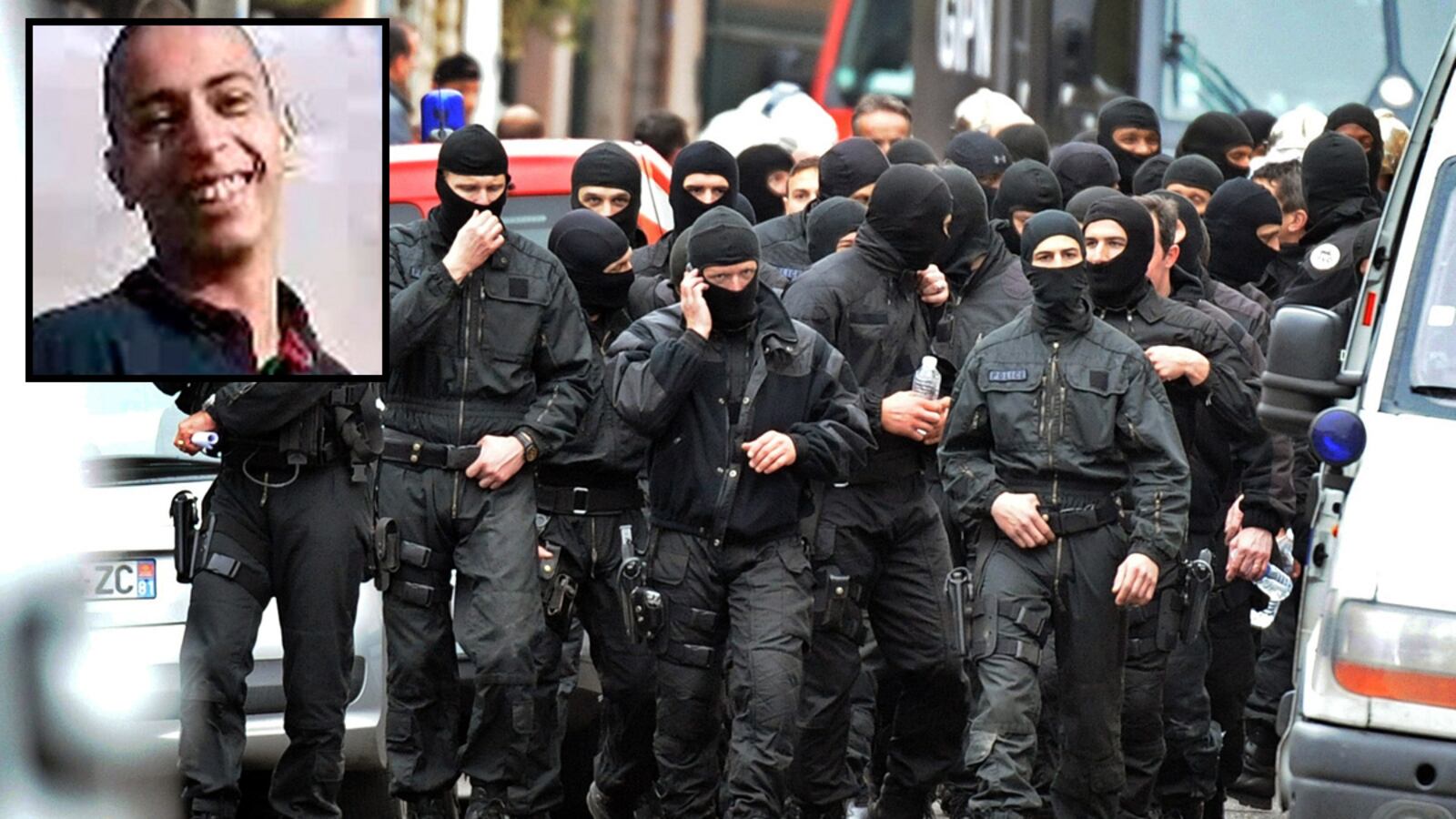After a 32-hour standoff, and an extremely violent five-minute firefight, Mohamed Merah is dead. The suspect is believed to have been the Scooter Killer, the motorcycle-riding gunman who killed seven people: three children and a teacher at a Jewish school less than three miles away on Monday in an attack that rocked France to its core, and three French paratroopers in cold blood and broad daylight in Toulouse and neighboring Montauban last week. Merah, a 23 year-old French national of Algerian origin, claimed links to al Qaeda and vengeance for France’s law banning the burqa, its role in the war in Afghanistan, and the treatment of Palestinians in conversations with police negotiators.Those conversations ended abruptly last night, as a man who had repeatedly promised to give himself up changed his mind, saying he wanted to die a mujahideen, guns blazing. At 10:45 p.m. Wednesday, Merah told a police negotiator, “If it’s me [who dies], I’ll go to paradise. If it’s you, too bad for you.” By 11:30 a.m. Thursday, he was dead.
The violent denouement brings an end to a case that has captivated the country, with non-stop coverage in the 75 hours between the Jewish school deaths and Merah’s demise, and brought a virtual halt to a presidential campaign, now a month to the day before crucial elections, April 22.
There will be regrets, as authorities and victims’ families alike stressed they wanted Merah out alive to answer for his alleged crimes. Authorities say that imperative explains the length of the standoff. The ultimate police raid came almost 12 hours after Merah’s last sign of life—two shots he fired after police blew the shutters off three of his apartment’s windows in powerful blasts around 11:30 p.m.—and nearly 32 hours after a first attempted raid failed, at 3:20 a.m. on Wednesday morning. In the initial attempt, Merah was waiting for police who had hoped to take him by surprise. Three officers were shot through a door in the first raid, in the shoulder, knee, and bullet-proof vest. Merah later traded a Colt .45, the model of firearm used in all three of the Scooter Killer’s sprees, for a walkie-talkie to communicate with police, but he was known to have more weapons at hand.
According to authorities, on Thursday morning, as police penetrated the apartment, Merah came out of the bathroom heavily armed and pushed toward the officers as he fired off an estimated 30 rounds from another Colt .45, injuring two. He made his way to the window and jumped over a balcony railing, still shooting. Officers returning fire shot him in the head. When he landed, he was dead, with two bullets left in the Colt .45’s charger. He wore a black djellaba tucked into blue jeans under a bullet-proof vest.

Before Merah suddenly changed his mind about giving himself up and threatened to kill the officers who would seek to apprehend him, the suspect was very talkative, from 7:00 a.m. to 10:45 p.m., all recorded by police and submitted to evidence today, explaining his training with al Qaeda in Waziristan and confessing to all of the murders in the Scooter Killer’s three- episode spree, authorities say. Merah, they say, regretted not having more time to kill more people and said he had planned to kill another soldier on Wednesday morning had he not been surrounded by police.
Unbidden, Merah led officers to a rented Renault Megane utility vehicle, found containing weapons including a revolver, a shotgun, and an Uzi. A second vehicle, a Renault Clio, was also found containing a weapon and some money. Merah told a police negotiator he paid for his weapons and ammunition through the proceeds of burglaries he committed. He also told police where he had stashed the notorious scooter, a dark-gray model Yamaha T-Max 530 he had stolen on March 6 in Toulouse. The scooter was used to meet the first paratrooper killed in a Toulouse parking lot March 11 and in the killing of two more paratroopers in front of a Montauban ATM near their barracks on March 15. It was painted white for the Jewish school shooting on Monday. Merah also led police to a bag, confided to a relation, containing a GoPro wide-angle digital video camera, the sort used by extreme sports enthusiasts, that the killer had strapped to his chest during the attacks.
In a press conference hours after Merah’s death, Paris public prosecutor François Molins said police watched the “extremely explicit” footage Merah had made of all three attacks as the standoff continued on Wednesday. Molins says the video shows that during his meeting on March 11 with Imad Ibn Ziaten, an off-duty paratrooper who had hoped to sell Merah a blue Suzuki Bandit motorcycle, Merah can be heard asking Ibn Ziaten about his job as a soldier before telling the victim, “You kill my brothers, I kill you,” and shooting him twice. In the second attack, which saw two more soldiers killed and a third take a bullet through the spine, Merah is heard screaming, “Allahu Akbar!” as he speeds away. Molins says the footage also show the Jewish school attack. He says Merah told a police negotiator that he had uploaded video of the killing spree to the internet, but no posted footage has been found.
An autopsy will be conducted on Merah’s body Thursday in Bordeaux. Paris public prosecutor Molins says that while it appears clear that Merah committed all of the killings in question himself, a search will continue for “any accomplice who might have either convinced him to commit the acts or provided him with the means to commit them.” Merah’s mother, brother, and brother’s girlfriend remain in police custody.
“Today, the French must overcome their indignation and not give free rein to their anger. Our Muslim compatriots have nothing to do with the mad motivations of a terrorist,” President Nicolas Sarkozy said in a speech shortly after Merah’s death. “Before targeting Jewish children, the killer shot Muslims at point-blank range.” Sarkozy also announced new measures that provide some insight into Merah’s presumed descent from petty delinquency to suspected mass murder. “From now on, any person regularly consulting websites that are apologist to terrorism or that call for hate and violence will be punished penally. Any person traveling to a foreign country to undertake indoctrination to ideologies leading to terrorism will be punished penally,” Sarkozy said.The president added that the justice minister had been asked to explore the propagation of terrorist ideology in the French prison system. “We cannot accept that our prisons become a soil for indoctrination to ideologies of hate and terrorism.” Merah, who had served time for purse-snatching and had been charged with several offenses stretching back into his adolescence, told a police negotiator himself that he started to become radicalized in prison and made two trips to Afghanistan and Pakistan as recently as October 2011.
As it happens, all of Merah’s alleged victims were buried during the course of the standoff. Jonathan Sandler, 30, his young sons Gabriel and Arieh, and Myriam Monsonego, the young daughter of the Ozar Hatorah school principal, were laid to rest on Wednesday morning in Jerusalem. On Wednesday afternoon, Sarkozy led a funeral ceremony for Imad Ibn Ziaten, 30, Abel Chennouf, 25, and Mohamed Legouad, 23—all French nationals of North African origin (one Christian, two Muslim) like their suspected killer—in Montauban, 30 miles north of Toulouse. Authorities say the attacker had planned to kill another soldier on Wednesday morning and had singled out two Toulouse-area police officers as future targets.
A month before France votes in the first round of its presidential election on April 22, candidates like Sarkozy and his main obstacle to re-election, the Socialist François Hollande, will both be back on the trail this evening, with rallies scheduled this evening in Strasbourg and Aurillac, respectively. The next month will tell whether the case of the Scooter Killer has irrevocably changed the course of this presidential campaign and so, in some measure, the course of French history.






